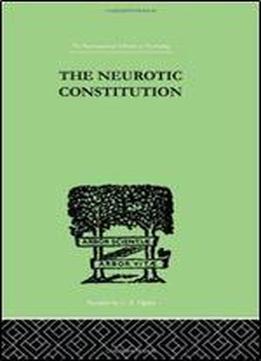
The Neurotic Constitution: Outlines Of A Comparative Individualistic Psychology And (international Library Of Psychology) (volume 112)
by Adler Alfred /
1999 / English / PDF
10.1 MB Download
First Published in 1999. Routledge is an imprint of Taylor & Francis, an informa companyPREFACE
After I had made the attempt to investigate in the Studie iiber Minderwe'rtigkeit von Organen the structure and tectonic of organs in association with their genetic basis, their functional capability and destiny, I proceeded, supporting myself upon already available data as well as upon my own experience, to
apply the same method in the study of psychopathology. In the book before us are embraced the most important results of my comparative, individual-psychologic studies of the neuroses.
As was the case in the theory of somatic inferiority, an empiric basis is made use of in comparative individualpsychology for the purpose of establishing a fictive standard of normality in order to enable one to measure and compare with it grades of deviation from it. In both of these scientific endeavors, the comparative method of study reckons with the origin of phenomena, dismisses from consideration the present and seeks to outline from them the future. This method of approach leads us to view the compulsion of evolution and the pathological elaboration 1f?as the result of a conflict which breaks
forth in the organic sphere for the purpose of attaining equipoise, functional capability and adaptation j the same struggle in the psychic sphere is under the command of a fictitious idea of personality whose influence dominates the development of the neurotic character and symptoms. If in the organic sphere,
f I the individual develops into a unit mass in which all of the individual parts co-operate toward a common goal" (Virchow), if the various abilities and tendencies of the individual tend toward a purposefully directed, unit-personality, then we may look upon every single manifestation of life as if in its past,
present and future there are contained traces of a dominating, guiding idea











